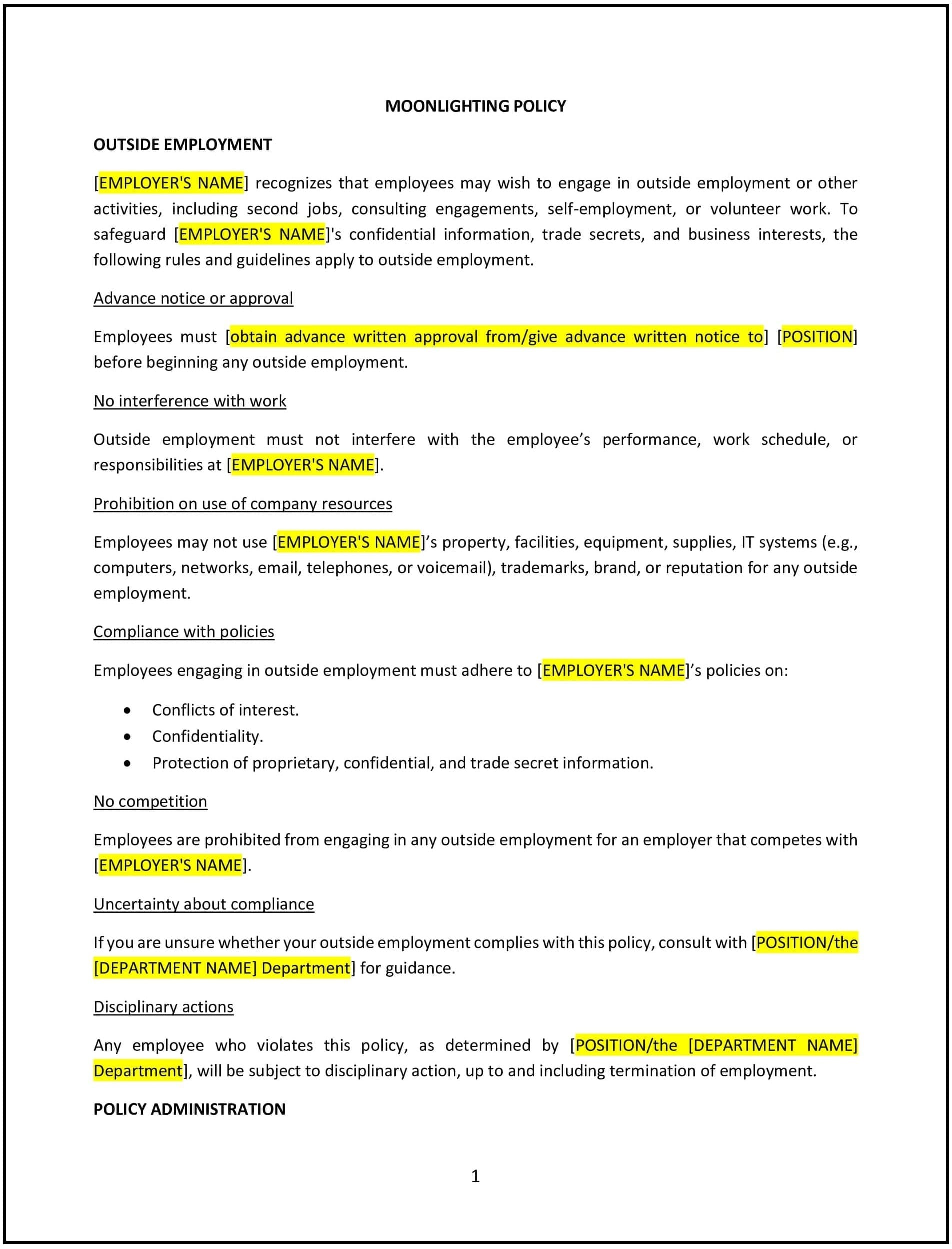Got contracts to review? While you're here for policies, let Cobrief make contract review effortless—start your free review now.

Customize this template for free
This moonlighting policy is designed to help Massachusetts businesses address and manage employees engaging in secondary employment, often referred to as moonlighting, while ensuring that it does not conflict with their primary job responsibilities. The policy outlines the company’s expectations regarding outside employment, the process for disclosing secondary jobs, and the guidelines for ensuring that moonlighting does not negatively affect performance, productivity, or company interests.
By adopting this policy, businesses can foster transparency, protect company interests, and maintain employee productivity while respecting employees’ right to pursue secondary employment outside of their primary role.
How to use this moonlighting policy (Massachusetts)
- Define moonlighting: Clearly define what constitutes moonlighting under the policy. This includes any form of secondary employment or business activities, whether part-time, freelance, self-employed, or contract work, that an employee engages in outside their primary role at the company.
- Establish disclosure requirements: Specify that employees must disclose any outside employment or business activities to the company. The policy should clarify how employees should report secondary employment, including any required documentation or forms.
- Set guidelines for secondary employment: Outline the conditions under which employees may engage in outside work, ensuring that it does not interfere with their primary job responsibilities, performance, or conflict with the company’s interests. The policy should specify that moonlighting must not cause a conflict of interest or breach confidentiality agreements.
- Address conflicts of interest: Include a section outlining how the company will address potential conflicts of interest. If an employee’s outside employment competes with the company’s business, violates non-compete agreements, or creates a conflict with company values, the company reserves the right to limit or prohibit such work.
- Clarify restrictions on outside business activities: Set clear boundaries around secondary employment. For example, employees should not use company resources, intellectual property, or confidential information in their moonlighting activities. The policy should prohibit employees from engaging in outside work that affects their work hours or availability to the company.
- Ensure transparency and fairness: Make it clear that the company will consider each moonlighting situation on a case-by-case basis, taking into account the nature of the employee’s job, their performance, and the nature of the outside employment. The policy should emphasize that decisions will be made fairly and consistently.
- Maintain compliance with Massachusetts and federal laws: Ensure that the policy complies with Massachusetts state laws, including the Massachusetts Wage Act and federal regulations related to employee rights and secondary employment. The policy should also ensure that it does not violate any labor agreements or union rules.
- Review and update regularly: Periodically review and update the policy to ensure it remains aligned with any changes in Massachusetts state laws, company practices, or industry standards related to moonlighting.
Benefits of using this moonlighting policy (Massachusetts)
This policy offers several benefits for Massachusetts businesses:
- Protects business interests: By requiring disclosure and setting clear boundaries, businesses can protect their proprietary information, intellectual property, and competitive advantage.
- Ensures employee performance: The policy helps ensure that employees’ secondary employment does not interfere with their primary job duties, work hours, or productivity, promoting higher work performance and accountability.
- Fosters transparency: The policy creates a transparent framework where employees are encouraged to disclose any secondary employment, reducing misunderstandings or hidden conflicts.
- Supports a fair work environment: The policy helps ensure that all employees are treated fairly regarding their outside employment activities, creating an environment of openness and fairness.
- Reduces legal risks: By addressing potential conflicts of interest and improving compliance with legal guidelines, businesses can reduce the risk of legal disputes related to employee moonlighting.
- Enhances company reputation: Companies that adopt clear, fair moonlighting policies demonstrate a commitment to supporting their employees’ side ventures while maintaining a focus on their primary responsibilities, which can enhance their reputation as a supportive employer.
Tips for using this moonlighting policy (Massachusetts)
- Communicate the policy clearly: Ensure that all employees are aware of the moonlighting policy and understand the importance of disclosing secondary employment. Include the policy in the employee handbook and communicate it through onboarding sessions or internal communications.
- Offer training for managers: Train managers on how to evaluate moonlighting requests and handle situations where potential conflicts of interest arise. Managers should be able to address these matters consistently and fairly.
- Track moonlighting disclosures: Maintain a record of employees’ disclosures regarding outside employment to ensure that all activities are documented and monitored. This will help identify any potential conflicts before they affect business operations.
- Promote a supportive work culture: Encourage employees to engage in activities outside of work, such as freelance work or furthering their careers, while also ensuring that these activities do not negatively impact their primary job responsibilities. A balance of support and clarity can help maintain employee satisfaction and productivity.
- Review and update regularly: Periodically review the policy to ensure it remains compliant with Massachusetts state laws, federal regulations, and any changes in business practices. Make necessary updates to keep the policy effective and relevant.